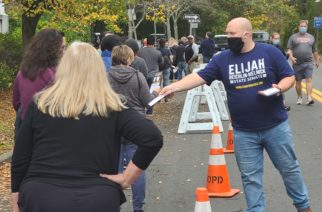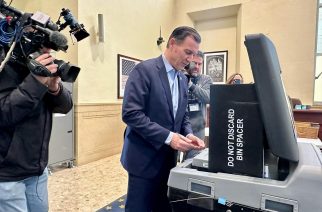
Earlier this session, the New York Senate voted on a bill (S.830) sponsored by Sen. Leroy Comrie, automatically restoring the right of formerly incarcerated individuals convicted of a felony to register to vote and vote in state, local and federal elections, upon immediate release from prison. The corresponding Assembly bill (A.04448-a) sponsored by Assemblyman Daniel O’Donnell is on its third reading.
Under this new legislation, individuals would not have to wait until they have reached the final date of their sentence to register to vote or vote in an election, as stated in the executive order passed by Gov. Andrew Cuomo in 2018.
“There’s a need for people who have been formerly incarcerated to reintegrate into society in every way possible,” said Assembly Member O’Donnell in an interview with The Legislative Gazette. “Other parts of the United States have begun to restore voting rights. Parole is a tough thing to survive. While you are living in the community and living the law-abiding life, the right to participate in the democracy of voting should not be impeded.”
With national attention focused on voting rights, and the debates happening in state legislatures across the U.S., New York lawmakers have a chance to expand the electorate. O’Donnell’s bill would permanently restore the vote to individuals released on parole and require officials to give these newly eligible voters an opportunity to register upon release.
O’Donnell’s office says the bill would be repealing a Jim Crow-era law originally intended to prevent Black men from voting.
Currently in New York, persons convicted of felonies who have been released from prison cannot vote while they are under community supervision unless they have had the right restored by a certificate of relief, a certificate of good conduct or a pardon from the governor, according to the bill memo.
In general, New York law allows persons convicted of felonies to vote after they have been discharged from parole or reached the maximum expiration of their sentences, which might not take place until after a formerly incarcerated person has spent many years in the community. The right to vote may be restored before a person is off parole by a certificate of relief or good conduct; but most parolees must wait three to five years before they can even apply for a certificate that may take two or more years to be issued or that can be denied without recourse, the bill memo states.
According to New York State’s Division of Criminal Justice Services, Probation is defined as “a sentence or disposition imposed by a criminal court or family court.”
Those who are on probation are returned to their community without serving a certain amount of time, in local incarceration. The Division of Criminal Justice Services also clarifies that there are times where a person may be sentenced to serve time in a local jail and have probation and that the sentence of incarceration should be running parallel with a sentence of probation. Parole is a time allotted of a correctional sentence served in the community while following a duration of time of incarceration in state prison.
New York is one of the few states that allows people released into community supervision the right to vote, along with Pennsylvania, Ohio, Indiana, Montana, Utah, New Hampshire and 14 other states.
Maine and Vermont do not revoke the voting rights of felons at all. “In the last couple of years, California, Nevada, Colorado, New Jersey have restored voting rights to those who are on parole.” according to Assembly Member O’Donnell. Florida voters passed a ballot measure that allowed 1.4 million Floridians with past felony convictions to vote. According to the Voting Rights and Elections Program, it is hoping to see federal legislation such as this into fruition.
According to Pew Trusts, 4.5 million people are on parole or probation nationwide at the end of 2016. They also state that African-Americans make up 30 percent of those on community supervision but just 13 percent of the U.S. adult population. Parallel to this, the Sentencing Project says that “One in 16 African Americans of voting age is disenfranchised, a rate 3.7 times greater than that of non-African Americans…Although data on ethnicity in correctional populations are still unevenly reported, we can conservatively estimate that over 560,000 Latinx Americans or over 2 percent of the voting-eligible population are disenfranchised.”
Deputy Director of the Voting Rights and Elections Program at the Brennan Center for Justice at NYU Law, Sean Morales Doyle, said, “New Yorkers who have been released from prison are working, paying taxes, and raising families, but they have no voice in their government. Today’s Senate vote brings them a step closer to regaining that voice.”
“I think the United States is long overdue for a reckoning about the way we use incarceration and why. We may have the highest rate of incarceration in the world, and that should not be. We need to find ways to address behavior and mental health issues that often address addiction issues. This bill is something that will contribute to addressing these issues,” O’Donnell said.









